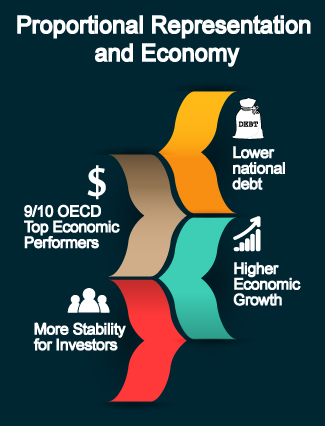Fair Vote Canada BC Sends an Open Letter to Members of the Urban Development Institute
- Details
- Published on Wednesday, 07 November 2018 14:22
- Written by editor

Dear FVC Supporter,
We recently learned that the President and CEO of the Urban Development Institute, a lobby group for property developers, sent a letter to their hundreds of member organizations urging a vote for first-past-the-post. The letter parroted the misleading claims about proportional representation being put forth by the official NO campaign and the BC Liberal Party. You can read the letter here:
https://twitter.com/MikePHager/status/1055606153890226181
Fair Vote Canada BC has responded with an open letter to the Urban Development Institute, sent with a press release, which you will find below.
You can also share the link to our letter at:
https://www.fairvote.ca/2018/11/02/open-letter-to-the-urban-development-institute/
Or from Facebook here.
Thanks for supporting the campaign to Make Every Vote Count!
Anita Nickerson
Acting Executive Director, Fair Vote Canada
November 2, 2018
An Open Letter to Members of the Urban Development Institute from Fair Vote Canada BC
Dear Members of the Urban Development Institute,

Fair Vote Canada BC was disappointed to learn that you received a letter from Anne McMullin, President and CEO of UDI, advising you to vote for first-past-the-post in BC’s referendum.
The letter made a number of points that are not borne out by the real-world experience of countries with proportional representation, which we would like to correct. We hope you will pass this on to your staff and encourage them to inform themselves before they vote.
The letter from Anne McMullin states that:
UDI is deeply concerned that a move to an unproven PR system would bring lengthy government instability.
However, this concern is not borne out by the facts:
-
A study of elections in OECD countries over 50 years showed there was no difference in the frequency of elections between countries with proportional representation and those using winner-take-all systems such as first-past-the-post.
-
Every year, the Fragile States Index ranks countries for fragility. The index looks at 12 measures of stability. The index indicates that nine of the top ten most stable countries in the world use proportional representation.
The letter expresses concerns also about economic uncertainty.
Yet a study of elections in 100 countries found less economic volatility in countries using proportional representation, providing more certainty for investors than the left-right lurch when governments change with first-past-the-post. Researcher Irfan Nooruddin finds that coalition governments of the sort we find in proportional representation countries produced less economic volatility due to the greater stability of economic policy, meaning to say, less policy lurch when new governments are formed.
Nooruddin explains that when a single party controls all the levers of the legislative process, it is better able to enact the policies it wants but cannot guarantee that future governments will not reverse course should the opposition win. This is likely to impact negatively on investment due to uncertainty about future policy.
He finds confirmation for this hypothesis based on a World Bank survey of firms across the world, noting that firms located in countries governed by coalitions of the sort produced under proportional representation are less likely to perceive policy uncertainty to be a major obstacle to their businesses and are more likely to invest in those countries.
Research shows that countries with proportional representation have higher economic growth, with the best performance by countries with levels of proportionality similar to what would be achieved by the systems on the ballot for British Columbia.
Here are a few other research findings:
-
Countries with proportional representation have lower taxes for business.
-
Countries with proportional representation have lower tariffs.
-
Nine out of ten of the top economic performers in the OECD use proportional representation.
The leaders of three BC parties, including the BC Conservatives, are in favour of proportional representation, as are most impartial experts. Thirteen previous independent assemblies and commissions in Canada have all come out in favour of proportional representation.
As business leaders, you may be concerned that proportional representation means a lock on power by one particular ideology, but countries with proportional representation are represented by governments of both left and right. What changes is that proportional representation builds genuine majority support for policies. This leads to less policy lurch and less business uncertainty when governments change.
We encourage your members to get the facts, and to vote in favour of long term stability and prosperity in British Columbia.
Sincerely,
Gisela Ruckert
President, Fair Vote Canada BC
Fair Vote Canada BC is a non-partisan citizens organization and a registered advertising sponsor in the BC referendum.
References
Alfano, M. & Baraldi, A. (2015). Proportional Degree of Electoral Systems Growth: A Panel Test. Rev. Law Econ. 2015; 11(1): 51–78.
Ardelean, A., & Evans, C. L. (2013). Electoral systems and protectionism: An industry‐level analysis. Canadian Journal of Economics/Revue canadienne d’économique, 46(2), 725–764.
Carey, John M. and Hix, Simon (2009). “The Electoral Sweet Spot: Low-magnitude Proportional Electoral Systems. PSPE Working Paper 01-2009. Department of Government, London School of Economics and Political Science, London, UK
Evans, C. L. (2009). A protectionist bias in majoritarian politics: An empirical investigation. Economics & Politics, 21(2), 278–307
Fund For Peace (2018). Fragile States Index, Global Data. http://fundforpeace.org/fsi/data/
Knutsen, Carl (2011). “Which Democracies Prosper? Electoral Rules, Forms of Government, and Economic Growth.” Electoral Studies 30: 83-90.
Nooruddin, Irfun (2011). Coalition Politics and Economic Development. Credibility and the Strength of Weak Governments. Cambridge University Press.
Norris, Pippa (2011). Making Democratic-Governance Work: The Consequences for Prosperity. HKS Faculty Research Working Paper Series RWP11-035, John F. Kennedy School of Government, Harvard University.
Pilon, Dennis (2007). The Politics of Voting: Reforming Canada’s Electoral System. Edmund Publishing.

Fair Vote Canada / Représentation équitable au Canada
283 Danforth Avenue #408Toronto, ON M4K 1N2
Canada
